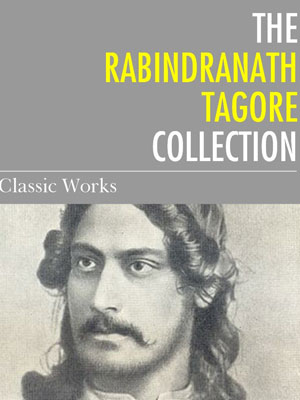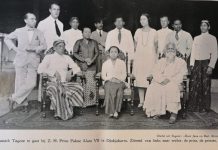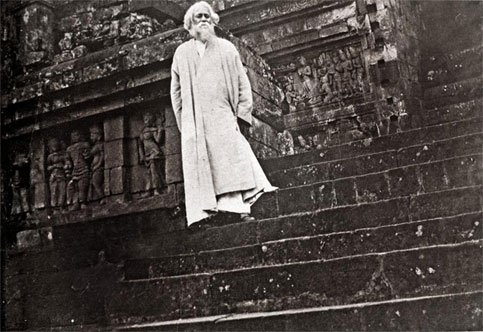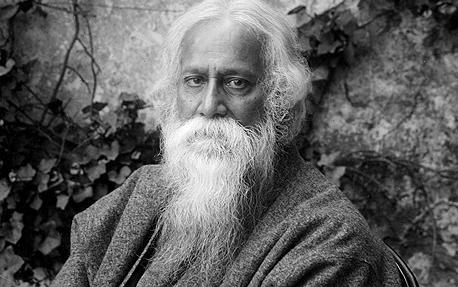37. Poem Mukti (Liberty) of the book ‘Palataka’ (Fugitive) written around 1915.
[Translator’s note: The poem was written at a time when ‘Women’s Lib’ was a far cry. The Bengali women then were supposed to be the housewives, preferably ideal ones in a joint family which was common in social pattern of that time. Child marriage was also no exception which achieved social integration of the girls with their in-laws’ families, which hardly left them with their own identities. Round the clock they would be busy with their kitchen and other household, keeping all their kith and kin in good humor, failing which they would only earn unpalatable disrepute. Most of them endeavored hard to keep up their goodwill as good housewife even at a great mental torment. The poem is on such a woman on her death bed after her prolonged illness. She is now looking back to her mundane life and trying to look forward to the vast world outside her household which was beyond her vision so long. The poem betrays the Poet’s deep compassion for a housewife rare in a man, which will deeply touch even the readers indifferent to others’ tragedies. At the same time, I am inclined to think that this housewife symbolizes the captive soul of mankind in general, locked up in daily mundane who cannot glimpse the beauty of God’s vast creation all their life. Thus, the poem assumes a universal character from its apparent depiction of an individual’s tragedy and extends its appeal beyond a particular milieu and time.]
Whatever the doctors advise“
Though it may not be wise
Keep open the windows
The wind soothes me that outside blows.
Medicine? Enough of it I had
To feel good or bad
With varieties bitter or strong
As directed day to day my lifelong.
Living itself is to ail
Ayurvedic and all else were of no avail.
A little slip here and there
Has its results severe.
Everybody’s ‘do’and ‘don’t’
To obey was my wont.
With my eyes down and veil drawn
Twenty two years I pulled on
At your household
So everywhere it is told“
There, an ideal housewife
Away from all strife.
I came to your family a girl of nine
Had my way through its long lane only to pine
Compliance of others’ will
That alone did my days fill
My life to drag on
At last to its termination.
Time to ponder my own weal and woe
Was never there as I did go.
So, this life is good or bad
Or something else, whatever I had
And where was the lack,
I had no chance to look back.
In its hackneyed moan
The weary work wheel turns on
To which I remained tied
Twenty two years, hypnotized.
I knew not
What import this vast earth has got
Never heard what Man’s message mute
Plays on the Eternity’s lute.
Only I know
There must go
Meal after the culinary zeal
And the latter to follow the meal
For long twenty two years
And that alone bears.
But now it does seem
That cycle no more I deem
Why then medicine again
If all are in vain?
In the wood the spring appears
That I missed all these twenty two years,
Never perceived its occurrence or absence,
Its southern wind’s fragrance
That rocked the earth
Its heart to exalt in heavenly mirth“
“Open up your door”
He called, as life on earth would bore.
May be it stirred my mind,
Caused slips in my daily grind
Or the pain sounded at my heart’s core
Of my incarnations of the yore
On my weal and woe lacking rationale,
The soul would pine for one of no avail,
As the ecstasy of spring
One’s arrival signal would bring.
In the evening you would return
For a re-exit after your supper done,
To a neighbor’s for chess game“
Leave it, for that none I blame.
But why in my mind to-day
All momentary emotions play?
First time in my life,
After twenty two years’ deprive,
Spring has entered my room
Shattering all gloom
I look through the window,
There the sky does show
The heavenly joy every moment
That my heart does foment.
A woman I am, in the mission
Of that primal feminine for creation.
My lute tuned to the moonlight
To play the music of the sleepless night
Devoid of me,
Vain would be
Rise of the evening star
And in the garden, blooming of the flower.
For twenty two years
Captive in your household spheres
That seemed ages
Yet, I had borne no grudges
Spent with a numb mind
My days to grind
I would prolong my sore
If I had to live more.
To all my kith and kin
A good housewife I’ve been
Within my confine, had my fulfillment
On sundries’ compliment.
To-day when unwitting
Snapped that string,
There at that vast juncture
Of the shore less sea and the river
Like bubbles are lost in that abysmal
All the kitchen wall.
After a long time plays high
My wedding flute there in the cosmic sky
My trifle twenty two years’ past
Let roll in my room’s corner in the dust.
In the Death’s nuptial chamber,
One Who calls implores my favor
Not only my Lord He is,
With slight never me to dismiss.
Of me He longs
The nectar that to my deep belongs.
From the court of the planets and stars
To my face blink less He stares.
Sweet is the world, so I’m that feminine super,
Sweet is Death, my eternal beggar
From my vain twenty two years’ bar
O open the door, across Time ferry me over.
37. Poem Mukti (Liberty) of the book ‘Palataka’ (Fugitive) written around 1915.
[Translator’s note: The poem was written at a time when ‘Women’s Lib’ was a far cry. The Bengali women then were supposed to be the housewives, preferably ideal ones in a joint family which was common in social pattern of that time. Child marriage was also no exception which achieved social integration of the girls with their in-laws’ families, which hardly left them with their own identities. Round the clock they would be busy with their kitchen and other household, keeping all their kith and kin in good humor, failing which they would only earn unpalatable disrepute. Most of them endeavored hard to keep up their goodwill as good housewife even at a great mental torment. The poem is on such a woman on her death bed after her prolonged illness. She is now looking back to her mundane life and trying to look forward to the vast world outside her household which was beyond her vision so long. The poem betrays the Poet’s deep compassion for a housewife rare in a man, which will deeply touch even the readers indifferent to others’ tragedies. At the same time, I am inclined to think that this housewife symbolizes the captive soul of mankind in general, locked up in daily mundane who cannot glimpse the beauty of God’s vast creation all their life. Thus, the poem assumes a universal character from its apparent depiction of an individual’s tragedy and extends its appeal beyond a particular milieu and time.]
Whatever the doctors advise“
Though it may not be wise
Keep open the windows
The wind soothes me that outside blows.
Medicine? Enough of it I had
To feel good or bad
With varieties bitter or strong
As directed day to day my lifelong.
Living itself is to ail
Ayurvedic and all else were of no avail.
A little slip here and there
Has its results severe.
Everybody’s ‘do’and ‘don’t’
To obey was my wont.
With my eyes down and veil drawn
Twenty two years I pulled on
At your household
So everywhere it is told“
There, an ideal housewife
Away from all strife.
I came to your family a girl of nine
Had my way through its long lane only to pine
Compliance of others’ will
That alone did my days fill
My life to drag on
At last to its termination.
Time to ponder my own weal and woe
Was never there as I did go.
So, this life is good or bad
Or something else, whatever I had
And where was the lack,
I had no chance to look back.
In its hackneyed moan
The weary work wheel turns on
To which I remained tied
Twenty two years, hypnotized.
I knew not
What import this vast earth has got
Never heard what Man’s message mute
Plays on the Eternity’s lute.
Only I know
There must go
Meal after the culinary zeal
And the latter to follow the meal
For long twenty two years
And that alone bears.
But now it does seem
That cycle no more I deem
Why then medicine again
If all are in vain?
In the wood the spring appears
That I missed all these twenty two years,
Never perceived its occurrence or absence,
Its southern wind’s fragrance
That rocked the earth
Its heart to exalt in heavenly mirth“
“Open up your door”
He called, as life on earth would bore.
May be it stirred my mind,
Caused slips in my daily grind
Or the pain sounded at my heart’s core
Of my incarnations of the yore
On my weal and woe lacking rationale,
The soul would pine for one of no avail,
As the ecstasy of spring
One’s arrival signal would bring.
In the evening you would return
For a re-exit after your supper done,
To a neighbor’s for chess game“
Leave it, for that none I blame.
But why in my mind to-day
All momentary emotions play?
First time in my life,
After twenty two years’ deprive,
Spring has entered my room
Shattering all gloom
I look through the window,
There the sky does show
The heavenly joy every moment
That my heart does foment.
A woman I am, in the mission
Of that primal feminine for creation.
My lute tuned to the moonlight
To play the music of the sleepless night
Devoid of me,
Vain would be
Rise of the evening star
And in the garden, blooming of the flower.
For twenty two years
Captive in your household spheres
That seemed ages
Yet, I had borne no grudges
Spent with a numb mind
My days to grind
I would prolong my sore
If I had to live more.
To all my kith and kin
A good housewife I’ve been
Within my confine, had my fulfillment
On sundries’ compliment.
To-day when unwitting
Snapped that string,
There at that vast juncture
Of the shore less sea and the river
Like bubbles are lost in that abysmal
All the kitchen wall.
After a long time plays high
My wedding flute there in the cosmic sky
My trifle twenty two years’ past
Let roll in my room’s corner in the dust.
In the Death’s nuptial chamber,
One Who calls implores my favor
Not only my Lord He is,
With slight never me to dismiss.
Of me He longs
The nectar that to my deep belongs.
From the court of the planets and stars
To my face blink less He stares.
Sweet is the world, so I’m that feminine super,
Sweet is Death, my eternal beggar
From my vain twenty two years’ bar
O open the door, across Time ferry me over.





